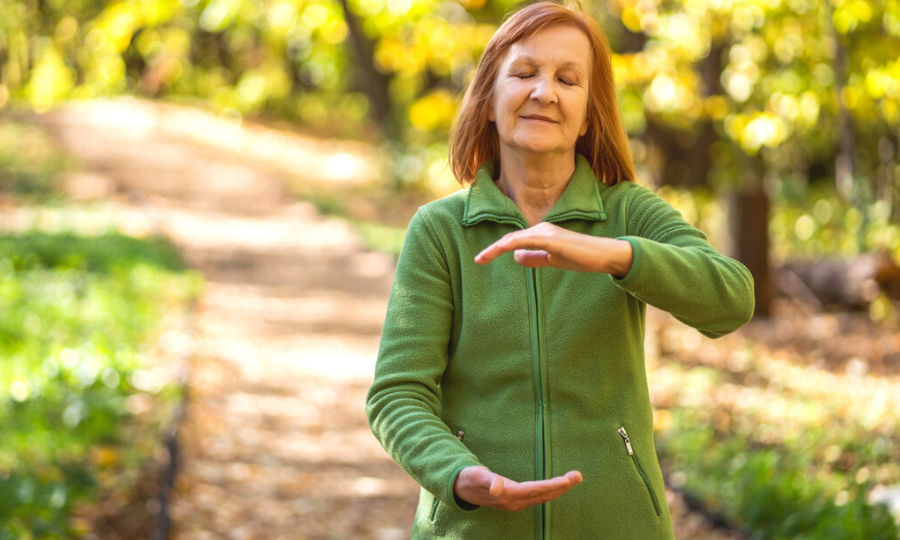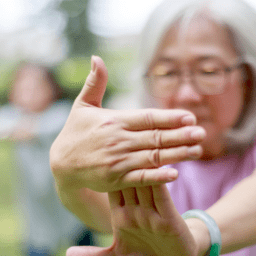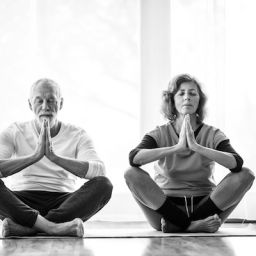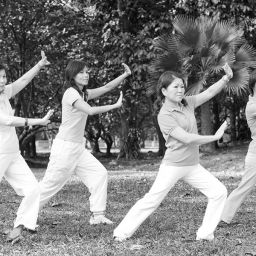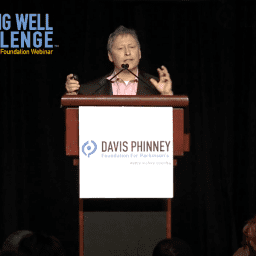Before he enrolled in a research study about tai chi’s impacts on Parkinson’s symptoms, Rob Scott had never practiced the art. Now, five years later, it is an integral part of his life, helping him live well with Parkinson’s at 67.
“Tai chi feels like a kind of meditation. A kind of paying attention and letting go at the same time.”
Rob was one of the participants in a 2016 study funded by the Davis Phinney Foundation and led by Dr. Peter Wayne, PhD, that explored the impact of tai chi on the cognitive and motor performance of people with Parkinson’s. Conducted at Harvard Medical School & Brigham and Women’s Hospital, the study used two types of fMRI-based neuroimaging to evaluate how attending a tai chi class for six months impacted participants’ cognitive and motor performance.
Because tai chi simultaneously integrates elements of balance, flexibility, coordination (motor function), and focused mental attention and multitasking (cognitive function), it can be an especially beneficial activity for people living with Parkinson’s. Results from the 2016 study confirmed this: findings showed that people with Parkinson's who participate in these exercises see improvements in Parkinson’s-related motor symptoms, balance, and mobility, as well as a reduced number of falls. Just as important, the research also indicates that engagement in these exercises helps to significantly reduce depression, a common non-motor symptom of Parkinson’s.
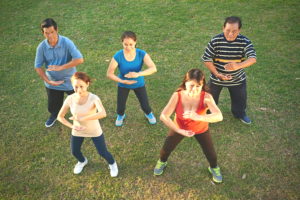 Though Rob joined the study having never practiced tai chi, he had long been interested in alternative medicine and complementary therapies, including acupuncture, which he enjoyed but is expensive. While looking for something new, he learned about Dr. Wayne’s study and jumped right in. He and his fellow participants were divided into two groups, one that would begin tai chi right away and one who would start later in the cycle.
Though Rob joined the study having never practiced tai chi, he had long been interested in alternative medicine and complementary therapies, including acupuncture, which he enjoyed but is expensive. While looking for something new, he learned about Dr. Wayne’s study and jumped right in. He and his fellow participants were divided into two groups, one that would begin tai chi right away and one who would start later in the cycle.
Luckily, he was part of the first group. “The teachers were excellent, and the twice weekly morning sessions forced me to get going on days that I would rather have stayed in bed!”
Kenny Tamarkin, who was diagnosed with Parkinson’s in 2015, learned about the tai chi study while exploring his options for participating in research. He was drawn to it, he says, because of the study’s “combination of physical activity and scientific rigor.” And this combination is exactly what he experienced — two MRIs (one before and one after the six-month research period), a weekly tai chi class taught by Stanwood Chang, an optional class taught by Jane Moss, and Dr. Wayne’s book and CD about tai chi to read and explore. “Even though it took more than an hour to drive to class, I eagerly looked forward to each one,” Kenny says. “An added bonus was the support and camaraderie from being in a class in which everyone either had Parkinson’s or was a support person of someone who did.”
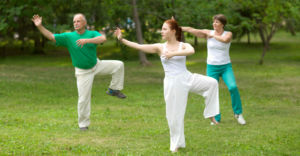
Kenny, Rob, and their fellow tai chi classmates quickly realized how the practice helped them move and feel better. “Peter [Wayne] likes to say that we will start slowly and then get slower,” Kenny says. “My version of that is that I began at the bottom of the class and then went down even lower. No matter how awful and stiff I felt at the beginning of class, by the end, I felt better.”
Rob says that he learned to “feel my body’s mood. I’d always heard about the benefits of exercise, for the mind as well as the body. Doing the exercises made me feel less stiff and more relaxed, mentally as well as physically.”
Having experienced these benefits, Rob felt motivated to continue his tai chi practice once the study was completed. “It was easy to do at home. There was no equipment to buy. It can help with balance issues. And I think establishing a daily routine is important; you need something to do even when you don’t feel like doing it,” he says.
Kenny, too, stayed with the practice and continues to do so on a regular basis. After the study ended, he found a tai chi class close to home led by the same teachers, and he enjoys that the group is a diverse one, with ages ranging from 18 to 80 and fitness levels ranging from “very healthy and fit to those dealing with various physical challenges such as chronic diseases, including Parkinson’s, and injuries from car accidents,” he says.

Rob says he would recommend tai chi “to anyone at any age and any stage of Parkinson’s.” Kenny agrees. “The gentle stretches and movements of tai chi can be practiced and benefited from at any level. Even though I now usually need a walker to get around, I do suspect that tai chi helped slow down my decline. While to an outside observer I might look like a clumsy beginner, I enjoy participating at the level that I can.”
Kenny’s and Rob’s experiences, and that of countless other people with Parkinson’s who have learned how tai chi helps them live well with Parkinson’s, shows how complementary therapies and a variety of exercises are important components of a healthy lifestyle. This is why, at the Davis Phinney Foundation, our research program is uniquely focused on improving quality of life now. Annually, we partner with leading researchers and institutions, such as Dr. Wayne and his team at Harvard Medical School & Brigham and Women’s Hospital, to fund quality of life research that shows promise to help change how people live with Parkinson’s, not years in the future but right away. Dr. Wayne’s tai chi study did just this, inspiring participants like Rob Scott and Kenny Tamarkin to take immediate action and live their best lives.
Get Involved
Guided by our Science Advisory Board, the Davis Phinney Foundation has supported more than 30 research studies focused on exercise, nutrition, gait, speech, telemedicine, alternative therapies, and other interventions that affect quality of life. Many of these studies have progressed to late-stage clinical research. Others have gone on to receive NIH and PCORI funding, while others have become therapies that are being used today by people living with Parkinson’s. You can play an essential role in this research by supporting our Quality of Life Research Fund. Click here to learn more about how your contributions help our Science Advisory Board say "yes" to more promising research projects that change people's lives.


